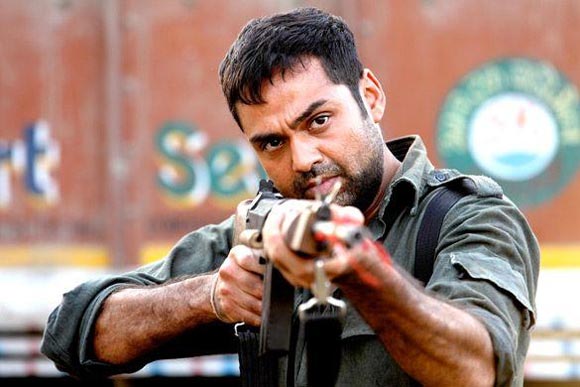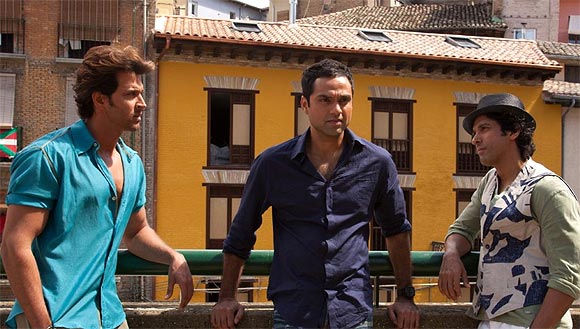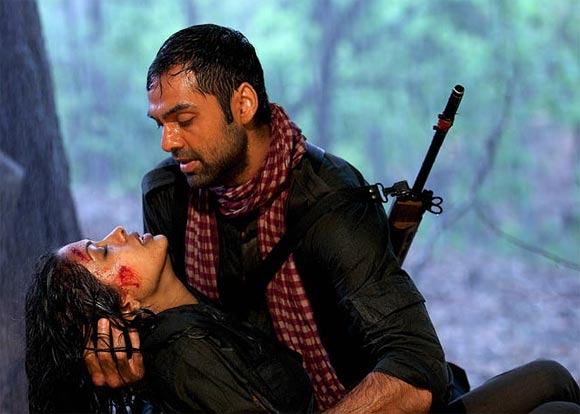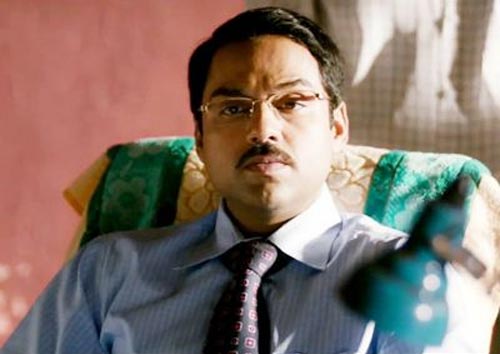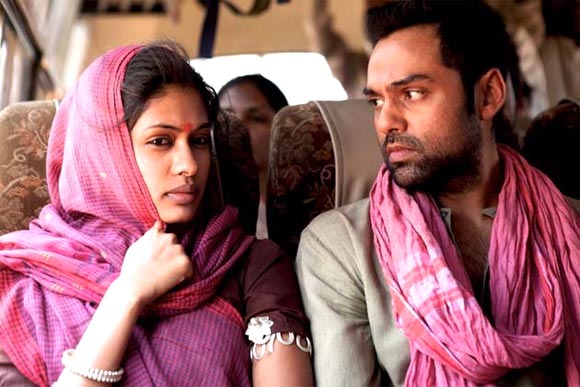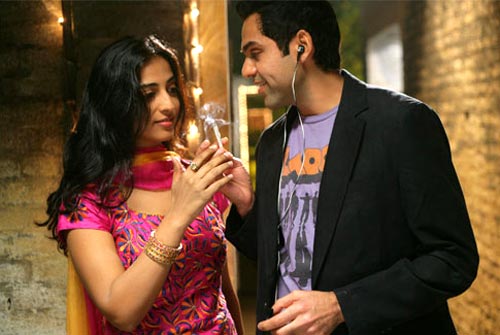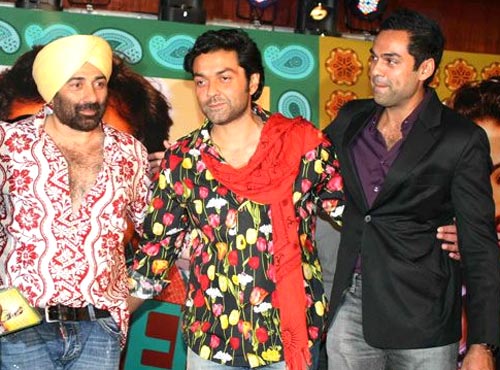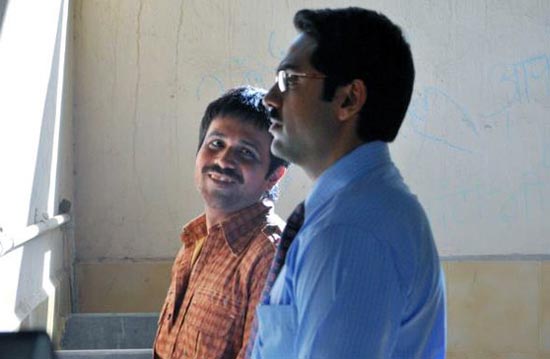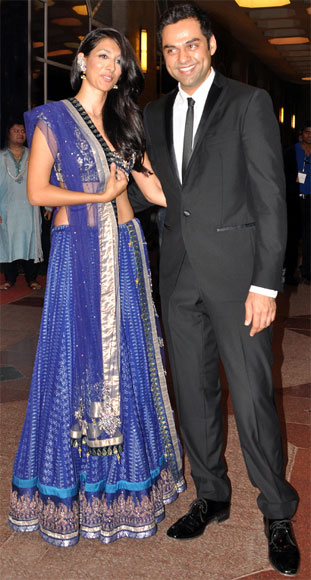 | « Back to article | Print this article |
'Corruption is entrenched in our country'
Abhay Deol is a unique actor, an almost Bollywood insider -- he is related to a famous family -- who became an outsider working in small Hindi-language indie films as the movement was beginning to find its identity in India.
Since the release of his first feature Socha Na Tha, the 36-year-old actor has acted with the likes of Dibakar Banerjee, Anurag Kashyap, Dev Benegal, Zoya Akhtar and now Prakash Jha.
Deol chats with Aseem Chhabra about his career, his new film Chakravyuh and his future as an indie film actor who is slowly transitioning to Bollywood.
Abhay, we talked before the release of Road, Movie and since then you have done four films -- Aisha, Zindagi Naa Milegee Dobara, Shanghai and now Chakravyuh. These are very big films, so how are you charting out your career?
I am trying to balance between formula and non-formula films. I don't like saying 'art films' or 'commercial cinema'.
So which are the formula films you have done? Zindagi... is not exactly a formula film.
To simplify things, I use the word formula. I would say that Zindagi... is a formula film on the surface. It's got beautiful locations, and the songs.
But if Aditya Chopra offered you a job, you will take it?
If I like the script, obviously. Why wouldn't I? It's a great banner to work with and they do some good stuff.
But since I have been doing particular types of films, I would like to marry this formula and non-formula film and find a middle path, no matter who offers the job to me.
I am not closed to working with them, but at the same time I have to consider what I have behind me.
'Larger-than-life characters are very boring'
Even though all of your films have not been hits, you have established yourself through those films. Can we say each of the films was a conscience choice?
They were conscience choices. I didn't want to do the normal routine Bollywood films. Escapist films were very boring. Larger-than-life characters again are very boring. I was naturally put off by them.
Which became evident to the industry too. You didn't get the regular commercial Bollywood film roles, right?
I did, but they would be the three-hero films and I would be the comic guy in it, with regular type of slapstick humour. So I turned them down.
There were a couple of big banners, not many. It didn't interest me. I didn't find that kind of work challenging enough. If I had done that, I would be lost in the crowd.
You did not feel you were in a crowd in Zindagi..., right? There were two major actors (Hrithik Roshan and Farhan Akhtar), although you managed to stand on your own.
That's the kind of script it was and that's the kind of director Zoya is. For her it was a story about three men. As long as I did my part, I was able to stand with them.
And she made sure each character came across one hundred percent. The film was about all three of us. So I was very comfortable there.
What did Zindagi do for you? That was your biggest film to date and it made so much money.
Everything is helping to open my market step by step. I acted in Shanghai after that and I think it helped a little bit, although it was a hard film to sell.
Now that people have seen me in Zindagi... and Shanghai back-to-back, the only thing they cannot be sure about is what kind of film I will do next.
For some time now it had translated into, yes, he does different cinema. Now they kind of know that, okay, it's not about being different; rather, it's about embracing different genres, as long as I am allowed to.
'Prakash Jha has been the most fun to work with'
Prakash Jha has a certain style of making films. There's always a big landscape with many actors. But you are one of two leads in his Chakravyuh. Why did you take this project at this stage in your career? You play someone who becomes a Naxalite.
Yes, I go undercover for the cops and then I become sympathetic with the Naxals. Whether I convert or not, it's best you see the film to find out.
Like with Zindagi..., I read through the script in one go, very quickly. It kept me extremely entertained. I could see the commercial potential in it and at the same time I saw the artistic integrity in it as well.
I loved my role. My favourite character was the one I had been offered. So why would I say no?
What is it like working with Prakash Jha? He's senior, he's been in the industry for a while and his films have a message.
He's been the most fun to work with. He has a fantastic sense of humour. It's very dry and it's below the belt. He's extremely efficient and quick. He prepares for months before he starts to shoot.
Not that I have had issues with other directors. I am very fond of Dibakar. I love Zoya. I would work with them at the drop of a hat.
With Prakash, one may think he is very serious because of the issues in his films and you will have to be on your best behaviour. But it was not so.
'I knew about the incidents of Naxals attacking jawans, cops and the killings'
What did you know about the Naxalite movement and what did you learn about it?
I know a decent amount. I am not fully uneducated (laughs).
I was very moved by the story of Soni Sori, the tribal woman who was stuck between a rock and a hard place, with the cops thinking she was a Naxal and the Naxals thought she was a cop. I read about her in Tehelka and about her nephew as well.
The story of Chakravyuh is amazing. It is fiction. Prakash hasn't based it on anyone's life. But it's a classic tale of going underground and sympathising with the people. It's a very old story actually. But you can adapt it to our contemporary environment. Just like Dibakar did with Shanghai.
I knew about the incidents of Naxals attacking jawans, cops and the killings. And there are about 200 districts that are still under their control.
You mostly play urban characters. This film has a more rural feel to it.
Shanghai is the first one that helped me break that. The role that actually took me outside of my actual circles is Krishnan. The Chakravyuh role also to some extent, but there my character is an educated city guy.
There are cases of human rights activists and doctors who are jailed. My character is one of your educated urban individuals who embrace the violent movement of the Naxals.
'The film should bring some awareness'
Did the film impact you at all?
Ah, my politics!
It's an important story to be told. People need to see this. Prakash, like Zoya, has the ability to make a statement and also mask it with all the commercial elements, without trivialising anything. It isn't in your face and he's not preachy either.
I am not saying this is right or wrong, but from Arjun's (Rampal) point of view, he's a cop. From my side I go undercover and so I represent the Naxals' perspective. You have two diverse ideas and Prakash is asking the audience to decide what is right and wrong.
That is how I stand too. I don't support a violent movement. I wouldn't pick up arms for anything. But at the same time, I believe you should call a spade, a spade. We have to face some very hard facts.
I don't want to just point fingers at the government and say they are corrupt and so we are suffering. I think people need to do a little something in their individual spaces.
Corruption is entrenched in our country. It's a systemic problem. The film should bring some awareness. It doesn't change my politics. It's only helped me look at my thought process through Prakash Jha's eyes and through my character. And so it has been an opportunity for me.
What is your next film?
Raanjhnaa. I have a special appearance. It is directed by Anand Rai and Dhanush and Sonam Kapoor star in it. I have five films lined up back-to-back. Actually, if you count Chakravyuh, there are six.
'I never had big names behind me'
If you look at yourself five or six years ago, before Dev D and Oye Lucky, Lucky Oye, would you see yourself reach where you have?
Well, obviously I had a bigger vision for myself. Why else would I be in the industry?
I wanted to open up the scale and production, but I wanted to do it with the kind of films I believed in as opposed to just doing it as projects that have the right actress, right producer and the right director.
I never had big names behind me. I still don't have big names ahead of me. Well, now I have perhaps -- Excel with Zoya and Prakash Jha have been great supporters in that sense. But I didn't plan that. Most actors plan big productions, co-stars and directors.
You did sit with Anurag and narrate to him the story of what became Dev D. You were charting a career for yourself, weren't you?
Yeah, with Dev D I knew I had something there. Giving a novel a contemporary take was not necessarily an original idea. Baz Lurhmann did Romeo and Juliet. But it hadn't been done in India.
I used to narrate it basing it in Los Angeles or Mumbai. Anurag finally based it in Delhi. I knew it was a commercial film. Ironically, no one saw it like that. People would say Bhansali made the film with Shah Rukh Khan, so why would you do it?
When Vikram and Anurag wrote the script, people said this sounds like a porn film. No one would make it. Every step of the way it was a challenge. It was mostly Vikas Bahl's support and faith in Anurag.
'People were curious because of my last name'
You come from a famous family and yet you had to chart your path.
Well, every actor has to have a plan. Like I was saying earlier, the normal plan is to work with big mainstream names. I didn't have that in my mind, or the privilege of that. So I had to chart my own path.
If that meant coming up with ideas for myself, I was ready to do it. I always write down ideas and synopsis. I don't write scripts. I have another one I am developing right now.
Did your last name help you at all, or was it a hindrance?
There were pros and cons. It came with good and it came with bad. It opened doors and people were curious because of my last name. They were willing to see what I was all about.
The cons were that my individuality didn't matter. I had to conform to an image, which I knew was going to happen. Every filmi kid goes through that.
Yes, both your cousins Sunny and Bobby did action films.
I wasn't conforming to that image so I met with resistance. But eventually I knew if I was consistently allowed to make films, whether they were hits or not, as long as I was consistent, I knew a collective work might support me.
I think after Oye Lucky it started to happen. Actually, after Manorama Six Feet Under, even though it wasn't a huge film.
At least people didn't say, okay, he is a young urban boy next door. I got to play an older small town engineer. From there it started to slowly open up more. Now the industry itself is changing. I don't think there was as much in 2007 when Manorama came out.
'The role that opened up opportunities for me as an actor was Manorama'
Which is your one performance that you are really proud of? Or for which film did you work the hardest?
I think the hardest I worked was in Shanghai playing the role of Krishnan. There are no professional speech and accent trainers in India. It was only easy because Dibakar was directing it. If he wasn't directing it, I don't know if I would have taken the role. So that was the toughest.
The role that opened up opportunities for me as an actor was Manorama.
It was a quiet role though, not as flashy as Oye Lucky.
Yes, but most people saw Manorama on DVD. Most people didn't know when it opened in theatres and that's what killed it.
But when people saw it, they said it's a good film. And people started to look at me slightly differently.
Oye Lucky followed that. It was a perfect blend of formula and non-formula. People then said I had a range.
'I am doing fine as an actor'
Would you like to direct a film?
Yes, but not right now. I am doing fine as an actor.
I have got my foot in the door, but haven't cemented my position at all. So I like to be a little bit more secure as an actor, before I go in to other avenues. And I don't have the confidence in me to direct.
What does cementing your position mean? To become an Aamir Khan or a Salman Khan?
To have a certain backing, a comfort zone, to be in a position that certain kind of people will always work with you. There are people who will always have a project for you. People will invest in you more than they invested in your last film.
Right now people put me in a box and they set a certain kind of budget. That also depends on the director who is making the film. I know when I do an Excel film or a Prakash Jha film, the budgets are always bigger.
When I work with a new director, the budget will be small. But I want to cement myself in the sense that whether it is a new director or an established director, the budget is appropriate to the film I am doing.
When people can say, let's invest the money that the film requires and not what the market is saying, that's an ideal place any actor would want to be in.
